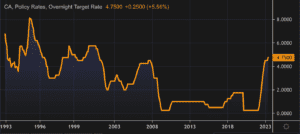Canadian economy running too hot, BoC increases Prime by .25%
Hot Economic growth leads the Bank of Canada to increase its benchmark interest rate

Today, the Bank of Canada increased its overnight interest rate to 4.75% (+0.25% from April) because of higher-than-expected growth in Canada’s economy in the first quarter and the view that monetary policy was not yet restrictive enough to bring inflation down to target.
Leading up to today’s announcement, many economists feared that the BoC would have no choice but to raise rates in the face of persistent inflation and recent GDP growth. Their fears were founded.
To understand the Bank’s thinking on this important topic, we highlight its latest observations below:
Inflation facts and outlook
- In Canada, Consumer Price Index (CPI) inflation “ticked up in April” to 4.4%, the first increase in 10 months, with prices for a broad range of goods and services coming in higher than expected
- Goods price inflation increased, despite lower energy costs
- Services price inflation remained elevated, reflecting strong demand and a tight labour market
- The Bank continues to expect CPI inflation to ease to around 3% in the summer, as lower energy prices “feed through” and last year’s large price gains “fall out” of the yearly data
- However, with three-month measures of core inflation running in the 3.50%-4% range for several months and excess demand persisting, concerns have increased that CPI inflation could get stuck materially above the 2% target
Canadian housing and economic performance
- Canada’s economy was stronger than expected, with GDP growth of 3.1% in Q1 2023
- Consumption growth was “surprisingly strong and broad-based,” even after accounting for the boost from population gains
- Demand for services continued to rebound
- Spending on “interest-sensitive goods” increased and, more recently, “housing market activity has picked up”
- The labour market remains tight: higher immigration and participation rates are expanding the supply of workers but new workers have been quickly hired, reflecting continued strong demand for labour
- Overall, excess demand in the economy looks to be “more persistent” than anticipated
Global economic performance and outlook
- Globally, consumer price inflation is coming down, largely reflecting lower energy prices compared to a year ago, but underlying inflation remains stubbornly high
- While economic growth around the world is softening in the face of higher interest rates, major central banks are signalling that interest rates may have to rise further to restore price stability
- In the United States, the economy is slowing, although consumer spending remains surprisingly resilient and the labour market is still tight
- Economic growth has essentially stalled in Europe but upward pressure on core prices is persisting
- Growth in China is expected to slow after surging in the first quarter
- Financial conditions have tightened back to those seen before the bank failures in the United States and Switzerland
Summary and Outlook
The BoC said that based on the “accumulation of evidence,” its Governing Council decided to increase its policy interest rate, “reflecting our view that monetary policy was not sufficiently restrictive to bring supply and demand back into balance and return inflation sustainably to the 2% target.”
The Bank says quantitative tightening is complementing the restrictive stance of monetary policy and normalizing the Bank’s balance sheet.
Going forward, the Bank said it will continue to assess the dynamics of core inflation and the outlook for CPI inflation with particular focus on “ evaluating whether the evolution of excess demand, inflation expectations, wage growth and corporate pricing behaviour are consistent with achieving” its inflation target.
Once again, the Bank repeated its mantra that it “remains resolute in its commitment to restoring price stability for Canadians.”
Next up
With today’s announcement now behind us, a new round of speculation will begin in advance of the Bank’s next policy announcement on July 12th.
Odds of New Rates
Market odds now have a July 12 hike at a 61% probability, with potentially another increase by December.
Just 1 more Prime Rate increase would take the benchmark prime rate from 6.95% at the end of today to a nosebleed 7.20% (last seen in February 2001).

There may well be another Prime Rate increase on July. We have strategies to beat these rates so please call and we can sort out a situation that works for you.
